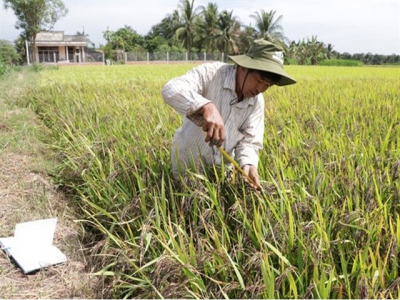No degree, no problem for this rice innovator

Research on creating new rice varieties is Pham Van Nhut’s favourite work (Photo: VNA)
Ben Tre (VNS/VNA) - Despite lacking a college or university education, farmer Pham Van Nhut in Mekong Delta province of Ben Tre has made great contributions to agricultural development in his community.
Nhut, a 52-year-old from Giong Trom District’s Phong My Commune, has restored or created more than 10 rice varieties with high quality, productivity and pest-resistance.
There were many challenges on the way to his success. However, he overcame them with the determination of a war veteran.
After demobilisation from the army in 1987, Nhut began rice cultivation on 3,000sq.m of land his parents gave him. Like other farmers at that time, he struggled to make ends meet.
He even thought of replacing rice with other plants after suffering losses for years.
In 1995, Nhut had the chance to attend a training class on rice hybrids organised by Ben Tre Province’s Agricultural Breeding Centre in collaboration with Can Tho University.
Inspired by teachers like professor Huynh Quang Tin and Nguyen Thi Thu Cuc from Can Tho University, he started creating his own rice strains.
"I wanted to generate a rice variety that is suitable to my locality to ease the hardship for local residents but I didn’t know how to do it. I only finished 12th grade at school and had not studied any special education yet," Nhut recalled.
Then, in 2011, he was invited to take part in a programme on rice breeding and biodiversity conservation under the framework of a project sponsored by the Netherlands.
Through the training and visiting key rice-production provinces in Mekong Delta, Nhut realised the need to restore OC10, a rice variety which suffered degradation, to provide salinity-resistant rice for local growers, which is also favoured by vermicelli makers.
It took him a year to complete the work. Following this success, Nhut revived other rice varieties including AGPPS-103, Hau My and Hon Dat, which were all later certified.
Nhut decided to expand his rice variety production.
He created a new rice variety named PM1 (Phong My 1) with high yield and pest-resistance.
“Despite having some advantages, I found out that the PM1 was not as delicious as I thought,” he said, adding that it took him three years to breed the variety.
Nhut continued generating other new rice varieties.
He tested multiplying herbal rice seeds that his friend brought to him from Japan three years ago. Now he has more than 3,000sq.m planted with this kind of rice, yielding four tonnes per hectare.
The herbal rice was fed with organic fertiliser to protect the environment. Fortunately, the rice was popular among consumers. With price of herbal rice of between 20,000-40,000 VND (0.9-1.7 USD) a kilo, double or four times higher than normal rice, farmers like him were in the money.
Nhut also worked with farmer in his commune to set up Phong My Rice Breeding Production Unit, specialised in providing high quality rice varieties. Each year, the unit supplies hundreds tonnes of rice varieties to the market.
In addition, Nhut has signed contracts with local farmers on organic farming to grow LH16 and herbal rice varieties and he takes care of sales.
Nhut said in the future he could collaborate with other farmers in building a brand for rice from Phong My Commune.
As his prestige spread over Mekong Delta, a Lao company invited him to go the Champasak, a province in southwestern Laos, to introduce his techniques to local farmers. It was here that he taught local residents how to use plowing and sowing machines.
Convinced by the effectiveness of the restored OC10, the Laos government decided to buy the rice seeds for cultivation.
Thanks to his achievements, Nhut won the title ‘Rice variety breeding and biodiversity conservation farmers in 1995-2015 from the Mekong Delta Development Research Institute and was honoured as an excellent farmer by provincial authorities in 2014 and 2016.
“Nhut was the one who pioneered in start-up business in the locality,” said Ho Van Tri, chairman of Phong My Commune’s People’s Committee.
Thanks to his efforts, Nhut’s family earns hundreds of millions of Vietnamese dong each year through rice cultivation, he said.
Tri hoped that in the future more support would be given to Nhut so he could expand his organic production. Once local rice had a trademark, income for local farmers would be boosted, he said.
Related news
 Feeling elated when exporting rice in the beginning of the year
Feeling elated when exporting rice in the beginning of the year It is forecasted that the demand for importing rice in the first quarter of 2019 will increase in traditional markets such as the Philippines and Indonesia
 Vietnamese rice makes name in world market
Vietnamese rice makes name in world market In 2018, Vietnam’s total rice exports reached 6.15 million tonnes, with export turnover of 3.15 billion USD. The industry saw a 5.7 percent increase in volume
 Dien pomelo - a Hanoi speciality
Dien pomelo - a Hanoi speciality With its unique fragrance and sweetness, Dien pomelo, grown in Phu Dien ward, Bac Tu Liem district, Hanoi, is a precious gift for the Lunar New Year (Tet)